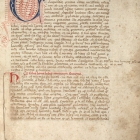De Vulgari Eloquentia and the ‘question of language’
The Trivulziano Codex 1088 is a paper volume dating to the end of the 14th century. Possibly Paduan in origin, it brings together in a single edition Dante’s De Vulgari Eloquentia and Albertino Mussato’s Ecerinis. Although unadorned the volume contains one of the three most significant examples of the manuscript tradition of the De Vulgari Eloquentia, the history of which ties in with the complex ‘question of language’. Rediscovered by Gian Giorgio Trissino shortly before 1513, Trivulziano 1088 was the main tool used by the humanist for the dissemination of Dante’s treatise in Florence and Rome. In the following centuries it lay neglected in the Venetian convent of Santa Maria della Salute, until it reappeared in 1817 as part of Gian Giacomo Trivulzio’s collection, where it was read with avid linguistic interest by its owner and his friend Vincenzo Monti. It remained part of the renowned Milanese family’s collection until it passed to the Castle’s Archivio Storico Civico e Biblioteca Trivulziana.
Leaf through the manuscript








